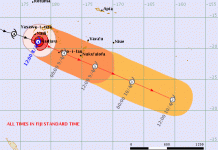The Supreme Court has used a Samoan legal precedent in ruling that the Attorney General has the power to intervene in, and terminate, private prosecutions.
Lord Chief Justice Paulsen said the ruling arose out of an action by ‘Etuate Lavulavu and his wife, who are facing charges of obtaining money by false pretences and knowingly dealing in forged documents.
These arose out of their involvement in the affairs of an educational organisation called ‘Unuaki-‘O-Tonga Royal Institute.
The charges were laid following an investigation authorised by the Auditor General.
In response Mr. Lavulavu began civil proceedings for judicial review of aspects of the special audit. He also began private prosecutions against four people involved in the review.
When the private prosecutions came before the Magistrate’s Court for committal, the then Acting Attorney General applied to take over the prosecutions and to terminate them.
He claimed that Clause 31A (l)(b) of the Constitution, gave him the authority on behalf of the Crown to manage all criminal prosecutions in the Kingdom.
The Acting Attorney General argued that there was insufficient evidence to support the prosecutions, that there was no public interest in the pursuit of the prosecutions, that the prosecutions were an abuse of the Court’s processes and that the interests of justice required them to be terminated.
Mr. Lavulavu opposed the Acting Attorney General’s applications.
On April 9, 2019, Principal Magistrate Mafi ruled that the Acting Attorney General had no right to intervene to conduct the prosecutions without Mr Lavulavu’s consent.
However, he stayed the prosecutions until after Mr Lavulavu’s trial in the Supreme Court.
The Acting Attorney General appealed the Principal Magistrate’s ruling. The recently appointed Attorney General, Mrs. Folaumoetu’i, appeared at the hearing of the appeal.
Mr. Lavulavu filed a cross-appeal seeking the lifting of the stay, so he could pursue the private prosecutions.
Mrs. Folaumoetu’i, argued that her right to intervene and discontinue a prosecution was recognised under common law and was contained in the powers conferred upon her by the Constitution.
She argued that a citizen’s right to bring a private prosecution was not absolute and was subject to the powers of the Attorney General; the existence and exercise of which were necessary in the public interest.
Mrs Folaumoetu’i said that to ensure decisions to prosecute were exercised lawfully and properly, the Attorney General must have powers of supervision and intervention.
“Mr. Lavulavu spoke of the personal toll that the Auditor General’s special audit has had upon him and the steps that he has taken to obtain justice, for what he perceives are wrongs done to him,” Lord Chief Justice Paulsen said.
“He argues that there is nothing in Clause 31A which authorises the Attorney General to intervene in a private prosecution.
“He submitted that the Attorney-General is not impartial or independent as she is the advisor to the executive and legislative branches and also effectively representing the Auditor General in the prosecution against him.”
Lord Chief Justice Paulsen said the Attorney General was not in Cabinet nor a member of the Legislative Assembly. She was an officer of the Crown and was not answerable to them and had complete discretion to exercise her legal powers and duties.
The judge reviewed legal authorities in Canada, New Zealand, Fiji and Australia and said that Samoa provided appropriate guidance.
“The Court of Appeal of Samoa found that .the Attorney-General’s decision to discontinue a private prosecution is reviewable but only on the grounds of “flagrant impropriety” in the exercise of the discretion,” he said.
“The Attorneys General in Samoa and Tonga fill similar constitutional positions and I can see no reason why the same approach would not apply in Tonga.
“A private prosecutor aggrieved by a decision of the Attorney General to intervene would, in my view, be entitled to seek a judicial review of that decision in this Court.”
“The Attorney General’s appeal is allowed and the ruling of the Principal Magistrate is quashed in its entirety,” he said.
“The Attorney General is granted leave to intervene and conduct the private prosecutions brought by Mr. Lavulavu.
“The cases are to be called before a different Magistrate on the first available date after August 1, 2019, at which time the Attorney General is to advise if she will pursue the prosecutions or discontinue them.”
The main points
- The Supreme Court has cited Samoan legal precedent in ruling that the Attorney General has the power to intervene in, and terminate, private prosecutions.
- In his ruling on the case, Lord Chief Justice Paulsen said the ruling arose out of an action by ‘Etuate Lavulavu and his wife, who are facing charges of obtaining money by false pretences and knowingly dealing in forged documents.







